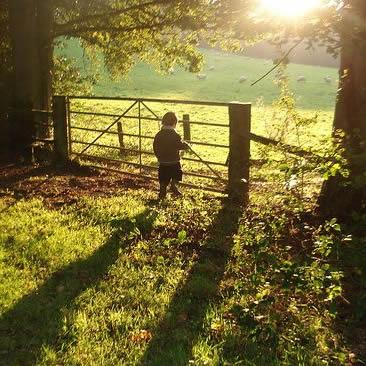Nostalgia just ain’t what it used to be. You sort of have to be British to see why this particular non-joke is funny. It belongs with Kendal Mint Cake, the M25, Cheer up! It might never ‘appen! and rain on Bank Holidays. These are all pretty simple things to explain but you have to be native and to the manner born to really get them.
Burnt By The Sun at the National Theatre is an adaptation of a famous Russian screenplay of the same name. It is the story of Kotov, a semi-retired general of the Soviet Army, whose love for Maroussia, his much younger wife, and his indulgence of her bourgeois relatives may end up costing him everything in one of Stalin’s great purges of the 1930s. Kotov, a marvellous, muscular performance by Ciaran Hinds, is enjoying an idyllic summer in the family dacha when crisis comes in the form of the unexpected return from exile of Dmitry, Maroussia’s first love, and the secrets he holds: both Kotov’s and his own.
Howard Davies directs a large cast on an impressive revolving set designed by Vicki Mortimer. Such is the size and scope of this production that it’s almost a surprise not to find it in the Olivier, although the more intimate Lyttleton auditorium is well suited to what is essentially a domestic drama set against the wider backdrop of a particularly brutal period in Soviet history. Rory Kinnear is a caustic, brittle Dimitry bristling with indignation at the injustice of his fate while Michelle Dockery is such a beautiful Maroussia that it is easy to see what all the fuss is about.
The good old days are long gone in Burnt By The Sun but a plaintive yearning for a musical past, filled with Puccini, permeates the play and gives it a melancholy, mournful beauty reminiscent of The Cherry Orchard. Chekhov’s name is mentioned in the dialogue and serves to underpin a particularly Russian form of nostalgia that could be characterised as naïve helplessness on the part of the rich when confronted with the ugly reality of life beyond the walls of their castles in the sky.
At the dawn of what appears to be a brand new Age of Austerity, it should be pretty hard not to participate in Kotov’s contempt for his in-laws’ constant laments for a life made possible by unearned wealth and an army of servants but, as the shadows lengthen in the second half, the past becomes a childhood summer when the sun shone every day.
You don’t have to be Russian to get this play. But it helps.
Burnt by the Sun is at the National Theatre until 21 May 2009.





